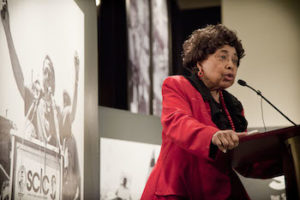
Dorothy Cotton
*Dorothy Cotton was born on this date in 1930. She was a Black activist.
She was born Dorothy Foreman in Goldsboro, North Carolina. Her mother died when she was three years old, leaving her and her three sisters to be raised by their father, Claude Foreman, a tobacco factory worker with only a third-grade education. Life was a daily struggle in their southern, segregated rural town. While in high school, she met Rosa Gray, an English teacher who encouraged her to be successful and strong. Being the director of the annual school play, Gray often cast her in the lead, which Foreman said made her feel "such a connection to her."
Gray helped secure a place for a Foreman at Shaw University, where she studied English, and she secured two part-time jobs on campus, one in the school cafeteria and the other cleaning the teachers' dormitory. When Dr. Daniel, a teacher at Shaw, was offered the Presidency job at Virginia State University, Foreman went along and worked as his housekeeper. Foreman described her job in the residence as "part daughter, part housekeeper.” While at Virginia State, she met and married George Cotton just after graduating. She then pursued and earned a master's degree in Speech Therapy from Boston University in 1960. It was in Petersburg that Foreman (now Cotton) got involved in a local church led by Wyatt T. Walker. It was here that her activism would begin.
Walker asked Cotton if she would be willing to help organize and train children for picketing campaigns. Her job was to teach them how to picket and march for the American Civil Rights movement correctly. Not long after she got involved, Martin Luther King Jr. was invited to the church to speak. The program for the evening included both King and Cotton. Cotton read a piece of poetry, and King became interested and later conversed with Cotton. While in Petersburg, King asked Walker if he would move to Atlanta to help King form the Southern Christian Leadership Conference. Walker said he would only go if he could bring Jim Wood and Dorothy Cotton. Cotton decided to go but to stay for only three months. She ended up staying for 23 years.
When Cotton first arrived in Atlanta, she was Walker's Administrative Assistant. Not long after, King recruited her to help at the Highlander Folk School, which received significant negative publicity. At Highlander, Cotton met Septima Clark, with whom she would work on the Citizenship Education Program, which was meant to help Blacks register to vote. Cotton’s close work with Clark and Esau Jenkins created a grassroots movement in rural southern areas during the violent and tense Civil Rights Era of the 1960s.
Jenkins drove a private bus to the mainland from the coastal Islands of South Carolina, taking island locals to and from their day jobs. During these rides, Jenkins would start conversations with his passengers about the power and importance of their right to vote. Esau recognized a dire need for educational programs to bring political and civil rights awareness and encourage black communities to act for change. These informal conversations were imperative to forming the base of initial participants in the Citizenship Education Program.
The Citizenship Education Program focused on teaching voter registration requirements and community and individual empowerment. Most Southern states had created the Poll Tax on voting and voter registration laws designed around literacy exercises to disqualify potential Black voters. Such requirements to register to vote included being able to recite random parts of the Constitution as well as signing one's name in cursive writing. Many of those imposing these prerequisites on Blacks were illiterate, rendering the process unreliable and subjective; many Blacks were turned away. The program sought to reinforce an awareness that their voting right were inviolable. The program also taught me how to deal with basic everyday needs.
Another hope for the program was to create a wave of education that would spread throughout the local communities, with the community members as the teachers. The education program planned to spread to other communities, and these programs and schools would be set up in different communities throughout the South and, ultimately, the entire United States. The program's goal is clearly stated in a brochure: "Their immediate program is teaching reading and writing. They help students to pass literacy tests for voting." These programs also covered the cost of tuition, training, and travel to the training center. With its commitment, the Citizenship Education Program would help many blacks register over the next few years.
The Citizenship Education Program profoundly impacted the movement, with well over 6,000 men and women participating in workshops and classes. She was also a member of the inner circle of one of its leading organizations, the SCLC. As the SCLC's Educational Director, she was one of the highest-ranked female members of the organization. Cotton helped James Bevel organize the students during the Birmingham campaign and its Children's Crusade, which conducted citizenship classes throughout the South. She also accompanied King to Oslo, Norway, to receive the 1964 Nobel Peace Prize. She was awarded an Honorary Doctor of Humane Letters degree at the University of New England in 1982 when she gave the commencement address.
In 1999, Dr. Cotton received the Honorary Doctor of Humane Letters from Spelman College in Atlanta, GA, and an Honorary Doctorate Degree from the University of New Rochelle. Cotton has traveled to the former Soviet Union, the People's Republic of China, Switzerland, Africa, Vietnam, and Europe while participating in international workshops and discussions on a broad range of current social and humanitarian issues. Dr. Dorothy Cotton, an opponent of voter suppression, died on June 10, 2018.
Michele Rubin, Writer’s House
21 West 26th Street
New York, NY 10010
212-685-2400